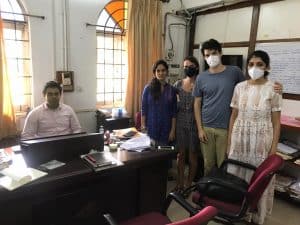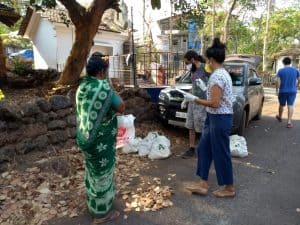Act for Goa gets Felicitated
Posted on 08/12/2022Josh was one of the first individuals to reach out to ActforGoa to see how he could help after the lockdown first started. He got on a call with Jill Ferguson, the ActforGoa Covid19 Response Lead to see who was providing on ground support for vulnerable communities. He made a list of everyone who Jill had posted about and began reaching out to them to see how he could help. After speaking with several people he realized that groups were being overwhelmed by the need, and the best way forward would be to connect people in need with people close by willing to help. Which started him on the process of creating https://goahelp.ushahidi.io/views/map this map/app to help onboard volunteers and register SOS requirements so people could connect to people in the area. From there he and his wife Shivangini jumped in with both feet to not only support the Goa Humanitarian Helpline answer SOS calls, but later even mobilize a group of friends to go out and identify, verify, and feed migrants across North Goa. Together these two have been instrumental in creating systems and standard operating procedures to streamline on ground systems of support for these vulnerable communities. These learnings and systems have been shared across the state to volunteer groups everywhere. We are incredibly grateful for all their efforts, and tireless/passionate support in stepping up to support the community.
What made you want to stand up and volunteer your time during this lockdown?
The realisation that this was an unprecedented crisis which was over burdening the system
and that we were in a really privileged position – we had access to resources and food and
we were healthy.
Can you tell us a little about yourself and what you normally do for work when you
aren’t doing this?
Josh is a freelance software engineer.
Shivangini is a researcher, writer. Dividing my time between telling people’s stories and
consulting with the Forca Goa Foundation.
What have you been doing to support marginalized communities during this
lockdown period?
When we realised that there were many like us who wanted to help, Josh began with
creating a volunteer map that helped identify who could help people locally. We were both
trying to help and coordinate help for people who needed it urgently – medicines to older
folks, food to families who were stuck.
Josh then ended up connecting with the Goa Humanitarian Helpline, and helped them
streamline their system for emergency cases.
By closing down all essentials, the Goa government has created a crisis for people across
the socio-economic spectrum. As things eased up and food and essentials became
available, it became pretty clear that the most vulnerable were large communities of daily
wage and other labourers who had lost all their income as a result of the lockdown.
We found our friends were mobilising funds, identifying communities and getting rations to
them as a stop gap, assuming that the government would get them sooner rather than later.
We jumped into this work and in about a week's time through iterative efforts came up with a
process for different volunteer groups in different areas.
1. We would get information through the GHH and others about a group of people
needing help.
2. Volunteers would then go and assess the situation to understand how many people
there were in the area, if other help was reaching them and identify a point person in
the community.
3. We would ask them to create a simple list with name, phone number, occupation and
home state.
4. We then verify that the information is correct by checking random sets of names on
these lists in person.
5. Packs of food are prepared by an amazing efficient packing team based on how
many people there are per area and household. Similarly there is another small team
that works solely on acquiring rations from wholesalers.
6. We then go with volunteers and hand out the packs for each household to one point
person who would verify their information with us using IDs or phone numbers.
7. Anyone who showed up seeking help who isn’t on the list goes on a new list that gets
prepared then and the process starts again from point 2.
What are some of the difficulties you have faced while trying to do this work?
While Josh and I were working on the ground with verifying information and distribution, our
main role ended up being liasing with the government. We have met with and spoken with
people across the hierarchy. Since the government machinery hasn’t had a clear process to
address this problem, understanding how and where we can come in and help has been
really challenging. In fact when we did arrive at clear ways we could help at the Taluka level,
the rules or directive from the higher level authorities would change voiding our best laid
plans and efforts.
What has been the most rewarding part of this experience?
Being able to use whatever skills and access we have to champion and help those who have
been marginalised gives us a sense that we are being helpful in some small way.
Working on such an immediate, clear problem when we tend to deal with more abstract, less
urgent issues in our usual work has been rewarding.
And connecting and getting to work side by side with incredibly skilled, smart people who
want nothing more than to be helpful has been truly amazing.
What do you need support with? / How can people help you continue this work?
We are taking some to consider how we move forward now. We jumped in at a time of crisis
to be a stop gap. We don’t feel qualified or comfortable taking on the responsibility of
supporting large numbers of migrant labourers and workers.
I suppose we could use ideas and support on how we can transfer our learnings to the
government who we feel strongly should be systematically addressing the problem. We want
to know how and who can empower these marginalized communities into being their own
champions.
Also, things are going to change a bit as the lockdown eases and we have to reevaluate the
situation.
What is one lesson you would take away from all this, or thing you would do
differently if you were to start over now?
1. The biggest lesson is that small local decentralised teams who are genuinely
interested in solving a problem are hugely effective. We were able to work quickly,
improve on our systems, share our learnings with other teams, learn from them and
come up with a process that worked for everyone really quickly. Coordinating
between effective small teams is easier than trying to move a large body along.
2. We started with the assumption that we would be able to hand over to the
government in some clear way. We have tried to do this to some extent but it’s
messy.
I think we would have oriented ourselves differently if we hadn’t started with this
assumption.
How many volunteers are you working with to do this work?
Just our team that’s been addressing the distribution in 4 areas in Bardez is made up of 6
people. But we have coordinated with 4-5 other volunteer groups to actually do this work.
How many migrants/day laborers have you feed/supported thus far?
I can’t put a number just for us. Our 3 groups who have been collectively accessing rations
together and have support from one packing operation who make food packs for us have
provided rations to around 2000 people.
We have been reporting collectively for the different volunteer teams and between us until
Friday we had given food packs for around 10,000 people. There are a couple of teams
providing cooked meals and one of them has been feeding around 3000 people a day
across Goa.








